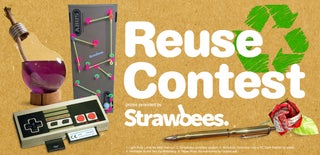Introduction: Claptrap Card Box
The best part of Borderlands is Claptrap, the CL4P-TP general purpose robot.
I wanted to include Claptrap at my wedding, and to give him a job to do, so I decided to make a Claptrap card box to guard the gift table.
Step 1: Making the Cardboard Body
I based the shape and design of my Claptrap cardbox on a simplified papercraft version of the robot.
There's a larger box that forms the body that slides on top a narrower box. When you need to access what is inside of Claptrap (in this case cards) you just lift up the bigger box.
I measured the papercraft Claptrap and scaled up the dimensions for the body. I cut the parts out of sturdy cardboard and taped the seams together.
You'll notice that the cardboard changes in the next step. After making the body out of this beer box I realized that he would be too small to hold the cards, so I rebuilt it with a larger box.
Step 2: Making the Eye Lens
The eye lens is made out of a bunch of different pieces, all glued together.
The big ball was created by papier machéing over a child's ball.
The tube was made out of a plastic icing tub with the bottom cut out.
For the inside of the lens, I cut the bottom off of a plastic juice bottle and glued it to the reflector and cover of a light made for jack-o-lanterns (like this).
A blue LED was glued into the centre, so the lens would light up.
Step 3: Building the Base
To keep Claptrap from tipping over, I decided to weigh him down by filling the wheel with plaster.
I mixed up a batch of plaster of paris and poured it into an almond milk carton. While it was setting, I inserted a small length of pvc pipe. I used tape to hold the pipe upright while the plaster set.
Once the plaster had hardened, I was able to remove the pipe and attach it to the bottom of the box that would hold the cards inside Claptrap. I reinforced the bottom of the box, where it joined with pipe, to prevent it from wobbling.
To give the inside box a more interesting texture, befitting the inside of a robot, I removed the top layer of the corrugated cardboard to reveal the wavy inside.
After a bit of trimming to get a good fit inside the body, the base was painted black.
Step 4: Papier Maché
To reinforce the body I covered it in papier maché.
I used white glue, diluted with water, and strips of torn paper.
Step 5: Painting a Base Coat
I painted the whole body with silver spray paint to give it a nice metallic base coat. I then use a paint brush to paint the inside of the body black.
Step 6: Wheel Details
I built the wheel around the carton filled with plaster.
I used two plastic plates to form the sides and wrapped the edge with thin cardboard. I then covered the edge with black craft foam.
I happened to find two broken kitchen sink stoppers that were perfect for the centre of the wheels. I glued them to craft foam circles to cover the sides of the wheel.
The tire treads were cut out of grey craft foam and glued to the wheel.
To make the parts that attach to the wheel, I glued together cardboard tubes. I painted them grey and added black electrical tape details.
Step 7: Paint and Details
First off, you might be wondering why we went with red, instead of yellow for our Claptrap. There are two reasons:
- Yellow didn't go with our wedding colours.
- I had planned to add additional spikes and blades to turn him into Taylor Kobb's badass Claptrap.
To give him the look of distressed painted metal, I painted acrylic paint over the silver base coat and then wiped a bit off while it was still wet to reveal the silver.
I made the warning and sound waves images in photoshop and printed them out. A piece of clear acetate was glued on top of the paper.
The front panels were cut out of craft foam and glued on. Additional craft foam details were added to the top and sides.
I used black electrical tape and a silver permanent maker for the lines along the top and eye lens opening.
The metal patches were made with pieces of aluminium. I cut some rectangles of aluminium out of pop cans and attached them to Claptrap with mini brads. I gave them a weathered look by rubbing on a bit of black paint.
Step 8: Wiring Lights & Arms
Please excuse the lack of more detailed photos for this stage.
We made the arms out of coat hanger wire, cardboard tubes and styrofoam balls cut in half. The hands were cut out of cardboard. Everything was glued together with hot glue and painted grey. As a final touch we glued in some electrical wire between the elbows and wrists.
There are two LEDs in Claptrap. One blue one in the eye lens and a green one at the tip of his antenna. Both are wired to a small switch and battery.
For the antenna we took apart an old tv antenna (the rabbit ear style), and removed the tip from one of the telescoping tubes. My partner soldered the green LED to two wires that we fed through the antenna and connected to the battery and switch.
Step 9: "Cards Go in Me!"
Since robot card boxes are not the norm at most weddings, I made a little sign to help our guests understand Claptrap's purpose.
The sign was just permanent marker on a scrap piece of cardboard, with a chain so it could hang from Claptrap's hand.

Participated in the
Reuse Contest













